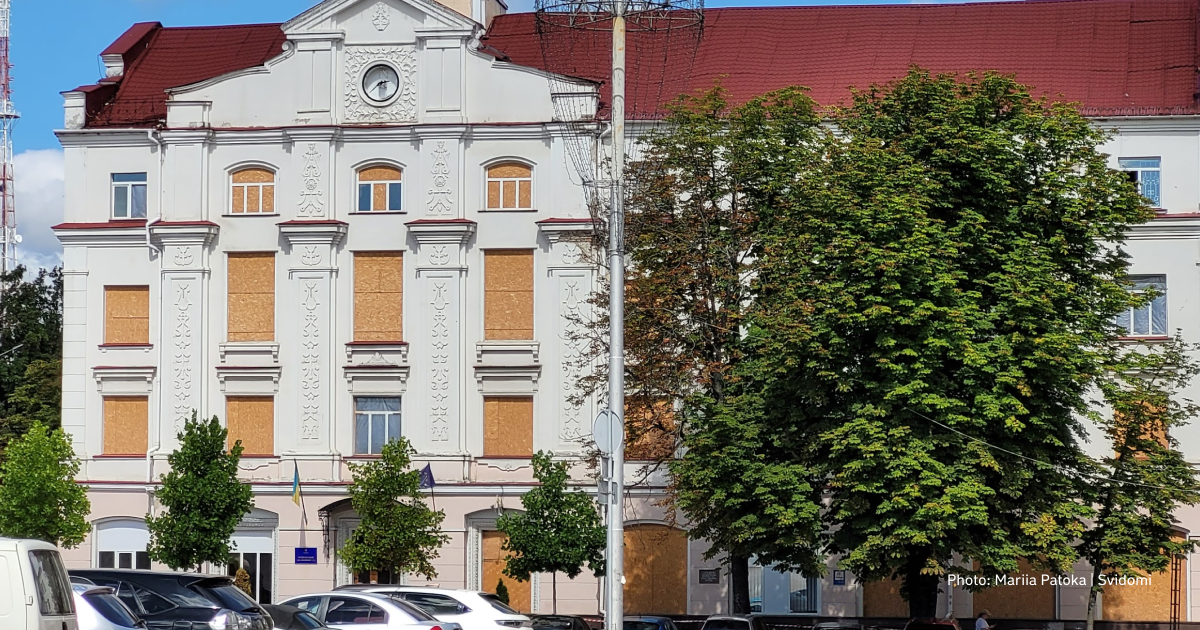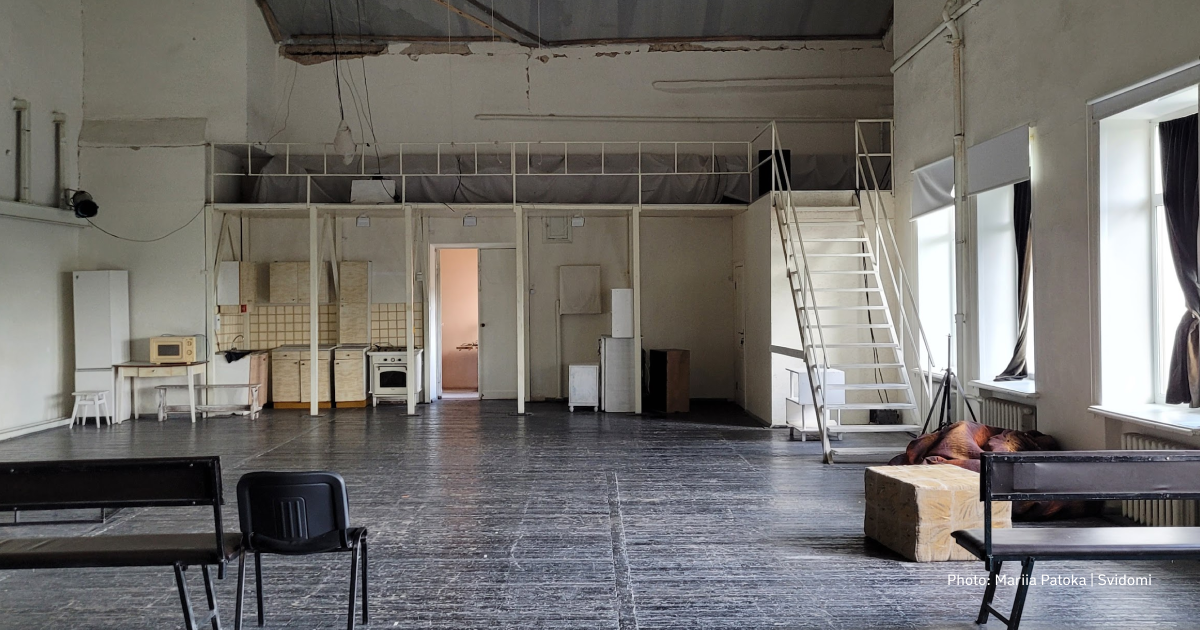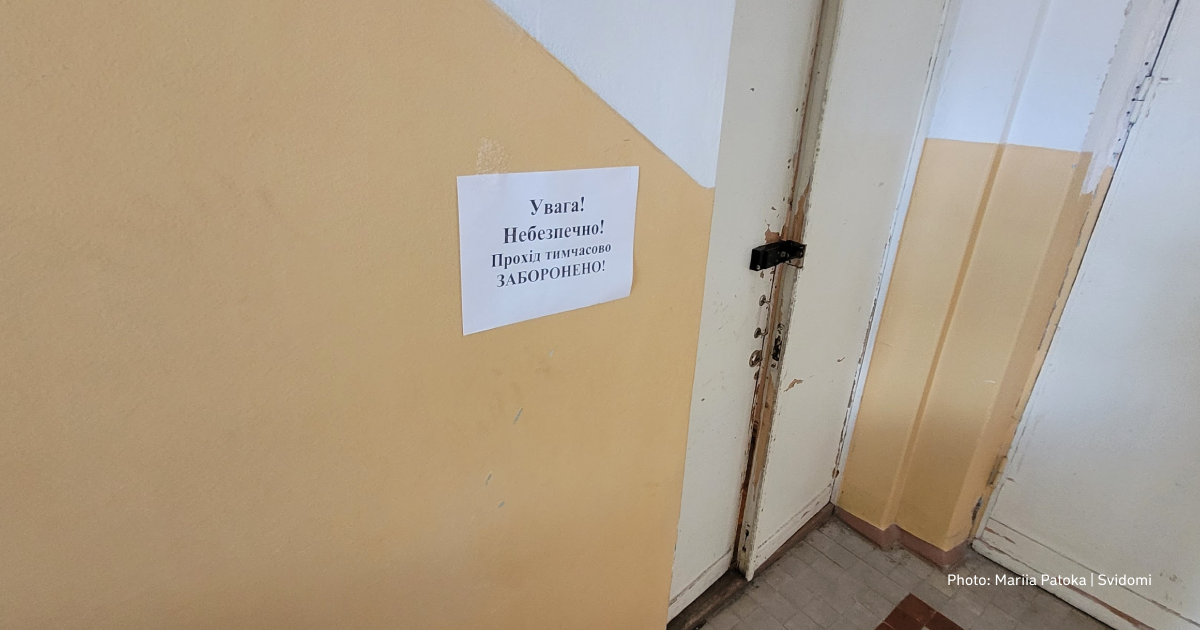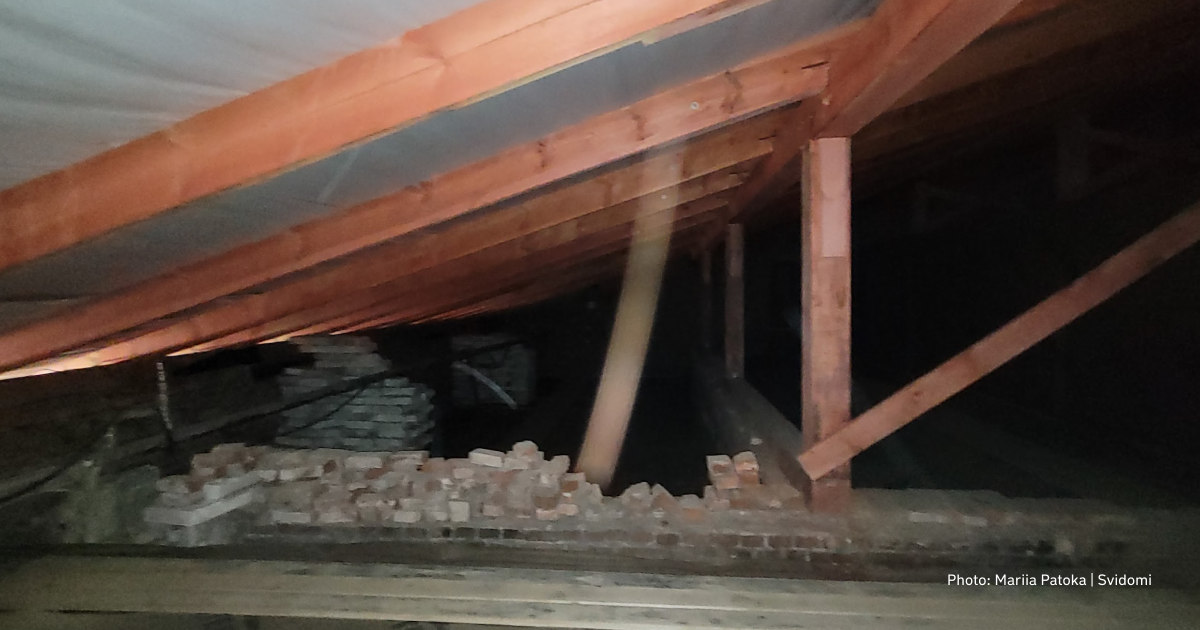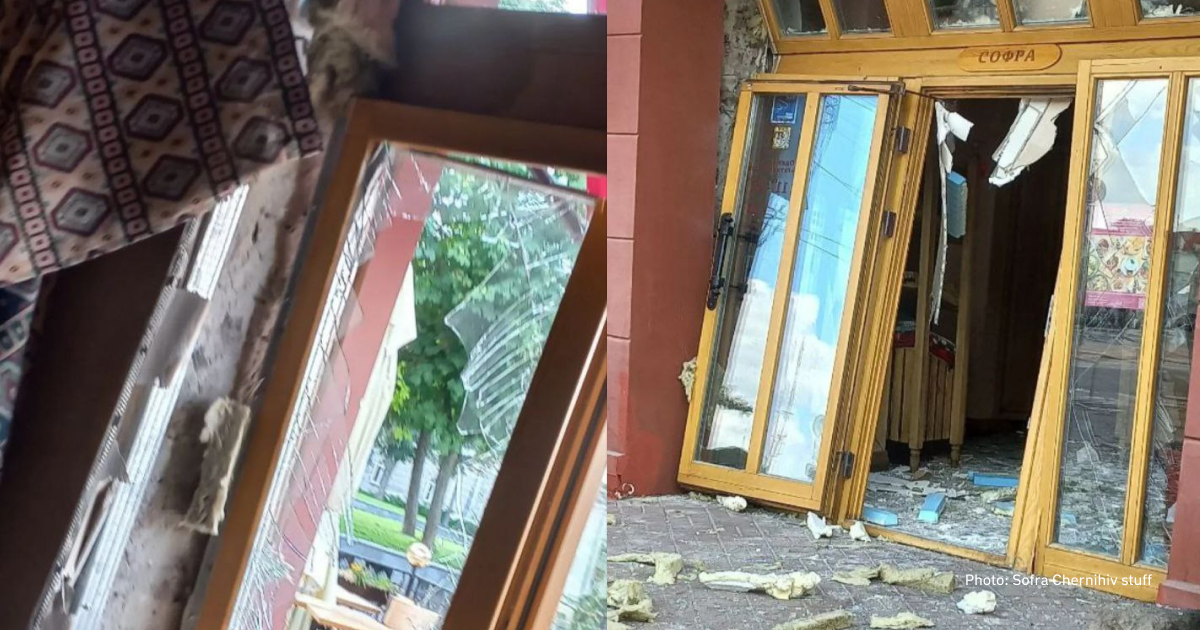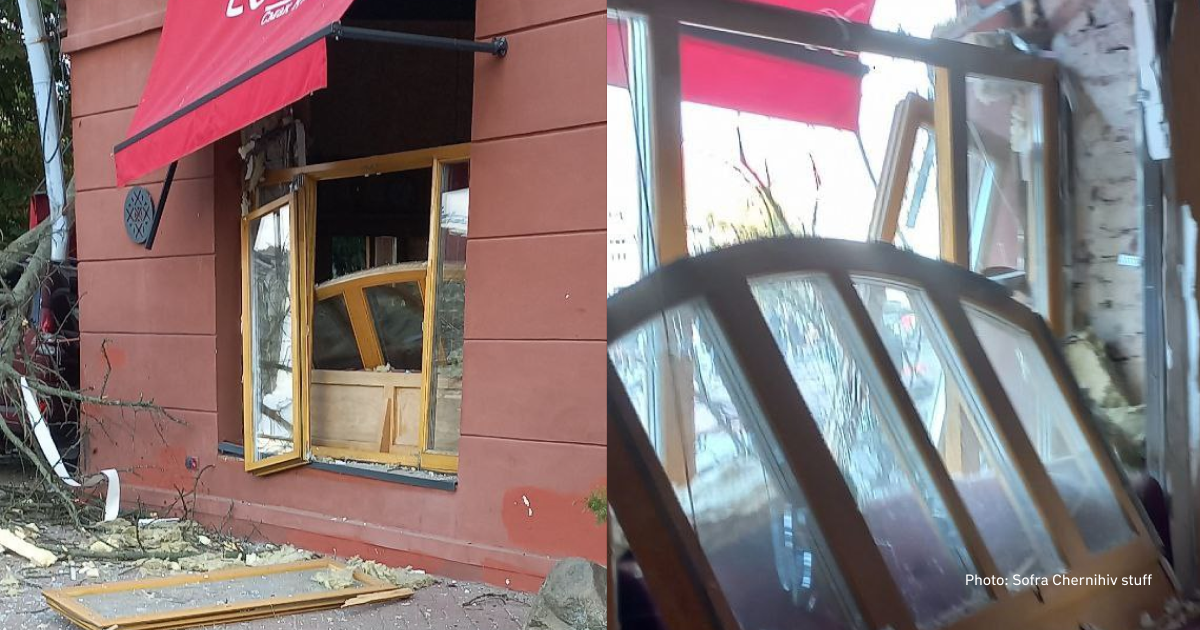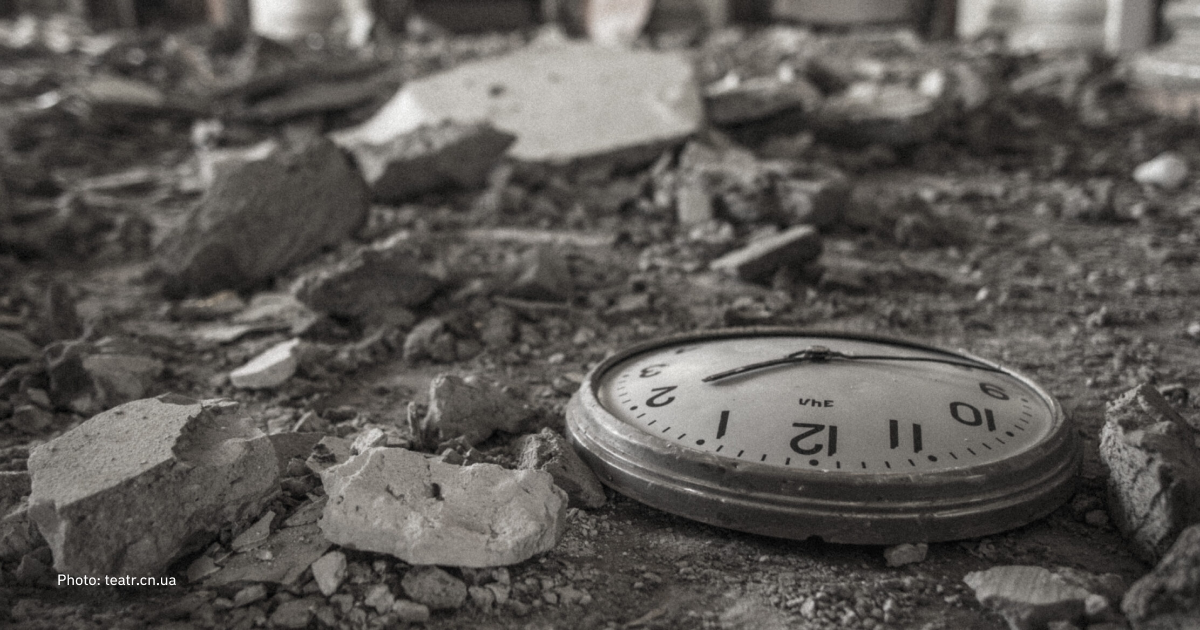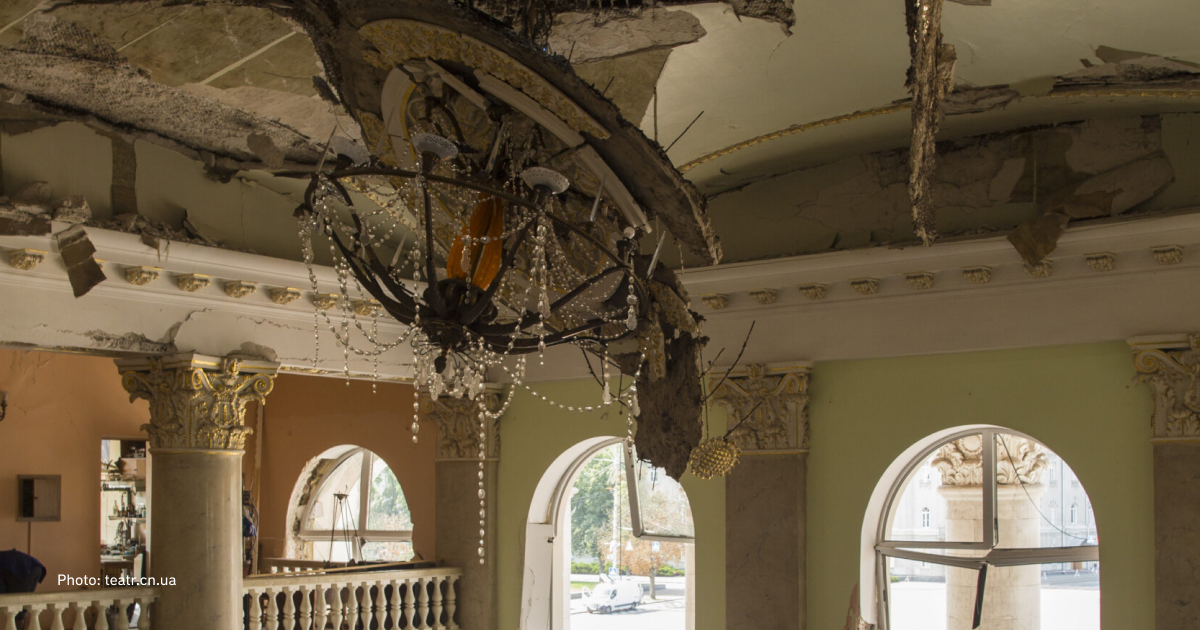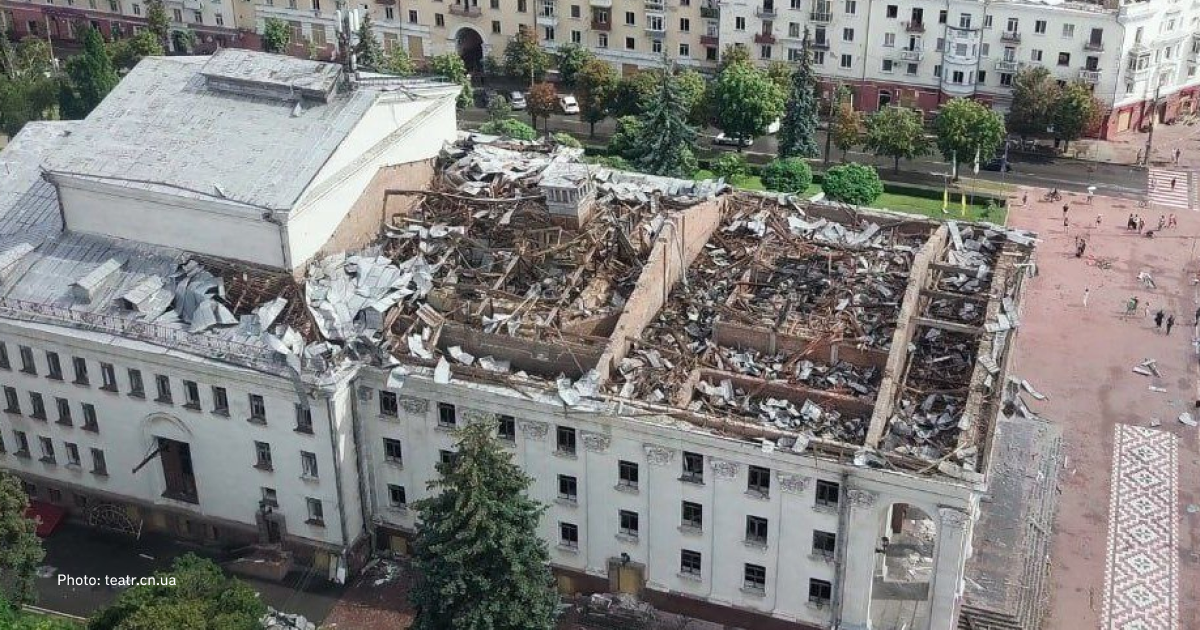"How Russkiy mir came to us." Chernihiv Shevchenko Drama Theatre, one year after the missile attack
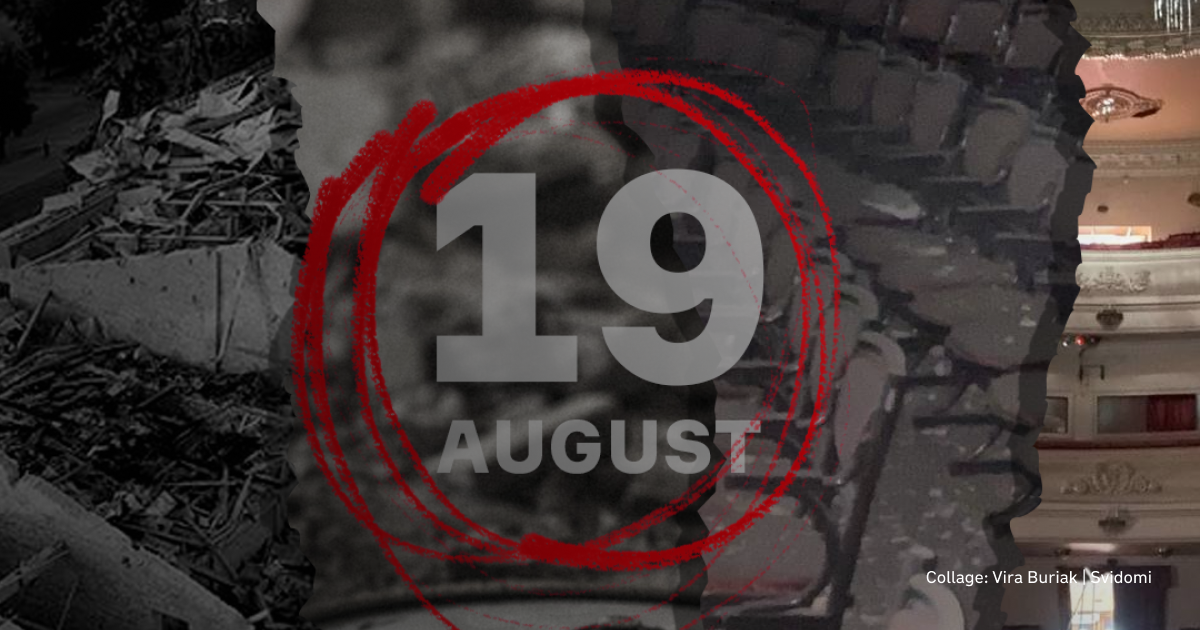
19 August 2023. Between 11 am and 12 pm, Russia launches a rocket attack on the centre of Chernihiv, a city in northern Ukraine on the border with Russia and Belarus.
The Russians targeted the Chernihiv Drama Theatre but did not intend to destroy the building. The rocket exploded in mid-air above the roof, scattering shrapnel across the square near the theatre, and the blast damaged the roof and windows of neighbouring buildings. The theatre would have collapsed as the roof cracked and fell inwards. The Russian military did everything it could to cause as much damage as possible, both to those inside the theatre and to those in the streets around it.
The theatre survived. The people inside survived. But seven civilians were killed in the square, including a child. Two hundred and seven people were injured.
August 19, 2024. One year after the tragedy, Svidomi talks about the restoration of the theatre and its surroundings, the theatre's work during the war, and the impact of the missile attack on the city.
Restoration of the Chernihiv Drama Theatre
The centre of Chernihiv, Krasna (Beautiful) Square. Here is the Taras Shevchenko Chernihiv Regional Academic Music and Drama Theatre.
Reminders of Russia's missile attack can still be seen a year after it happened. Some houses in the neighbourhood still have plywood covering their windows, and their roofs are being fixed. The theatre is also undergoing repairs. They are painting the poster pillars and reinforcing the building. You can see the theatre roof from the outside—it is thin for such a building.
That's because it's covered with bulletproof foil—a temporary solution to protect the building. Part of the theatre building remains inaccessible, but the Chernnihiv Theatre operates.
Serhii Moisiienko, managing director of the Chernihiv Music and Drama Theatre, describes how the theatre resumed performances within a month in a destroyed building.
"The strike was on August 19. It was an active rehearsal process, like every year. The next day, after the rocket strike, we were surprised to see many people from the city, volunteers and our drama group coming to clean up. We set to work removing glass, concrete and plaster. On the third day, we had our first creative rehearsal. It was important to get the cast together and tell them that we were working."
The theatre management and the cast wanted to stay on the premises and keep it the same. So they set up a small hall with a white stage for performances. The hall could hold just over a hundred people. They reinforced the walls and roof of the theatre building and partially patched the cracks.
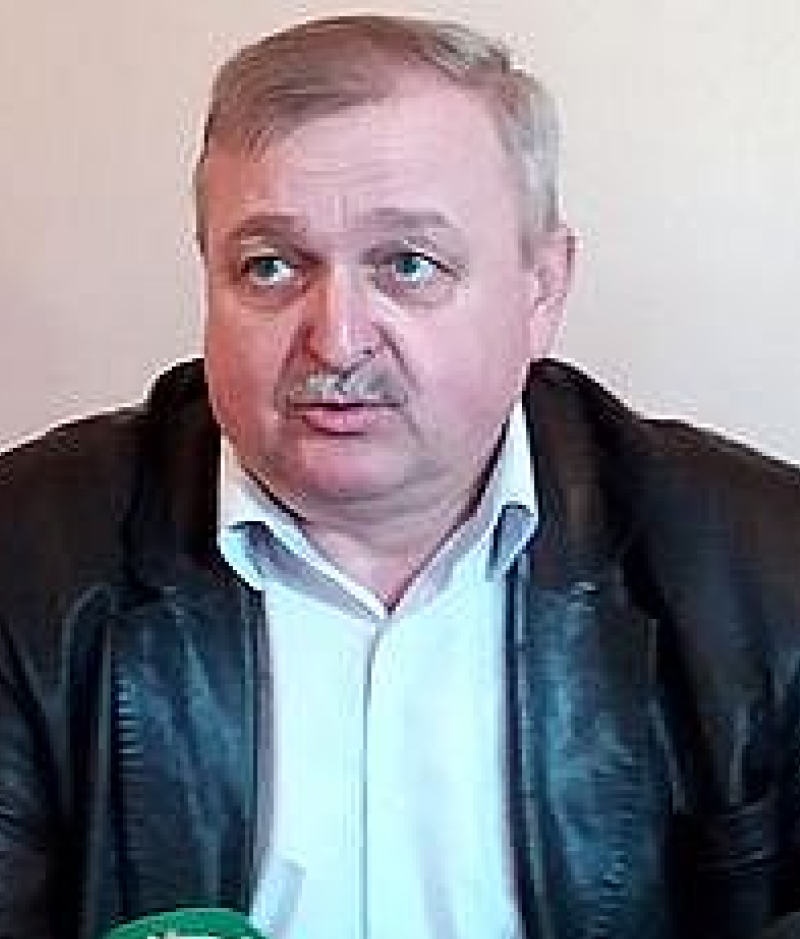
"The second location was a 'stage within a stage' on the main stage. We used a fire curtain to enclose the destroyed area and adapted the theatre for a hundred seats on the stage. The audience and the actors were right next to each other. We repaired what was left of our equipment, including the lights and sound, because the electronics were just ruined. We made sure that neither the staff nor the audience could enter the unsafe part of the building,"
the managing director tells us about the preparations for the season-opening.
While the theatrical season was underway and performances were running, the theatre building was still repaired and prepared for restoration. Serhii Moisiienko says that with donors' help, they restored the windows and doors, created a safe passage for the audience from the entrance to the hall, and now the theatre can present shows on the main stage again.
"As of today, construction work has been suspended. We still have one emergency location, but unfortunately, we have not yet found donors. The main issue is the project. We need to make a restoration project as an architectural landmark of local significance. This will make the restoration possible. It is an expensive process. Obviously, restoration is not on the agenda today. I follow the opinion of international donors, and even for them, the war is more important. Therefore, the priority is emergency and conservation work. When we end this war, which the Russians are shamefully waging, we will start the restoration," says Serhii Moisiienko about the priorities in the restoration of the theatre.
New themes, new plays and new directors — how the war affected the repertoire of the Chernihiv Drama Theatre
A rehearsal is in progress on the main stage. Several spotlights are directed at the actors while the rest of the hall is in darkness. The theatre is preparing for the premiere of the play Molochainyk, which depicts events in the temporarily occupied Kherson region in the spring of 2022 in the life of an average Ukrainian family.
The theatre's repertoire expresses the changes in Ukrainians' culture and self-perception. Currently, the theatre is staging Volodymyr Vynnychenko's drama Sin and the contemporary tragicomedy Allo in a chamber setting. In June 2023, the theatre will present War by Swedish playwright Lars Norén. The company and the artistic director are not afraid to tackle sensitive issues in the theatre.

Serhii Moisiienko explains how the theatre has changed its approach to choosing plays after Russia's full-scale invasion of Ukraine began and how Chernihiv audiences respond to the productions.
"A young director, Oleksii Trishkin, put on War. I must say at the outset that this is a non-grossing play, but we accepted this director's offer to do this work. It is his inner confession, a tribute and a touch to this war. We made a similar play called IDPs, which are internally displaced persons. In a way, we are talking about today. Now, the premiere of the show Molochainyk will take place on August 20. It tells about those people, those women, who were under occupation in Kherson," says the director of the war-themed plays.
In addition to the war theme, the theatre performs plays on 'eternal' themes, as Serhii Mosiienko puts it: themes about love and goodness, our land and country, and human relations.
"They say to me, "You should do comedy". Well, there can be comedy. But we need to talk about something. The same Molochainyk has a lot of local humour, surzhyk (a Ukrainian-Russian pidgin used in some areas of Ukraine and neighbouring regions of Russia and Moldova — ed). We have to be very careful with the repertoire not to rip people's hearts and souls out," says the director of the methods used to select plays for the productions.
The break with Russian drama has had a positive effect on Ukrainian theatres. There are more contemporary dramas; theatres can choose and promote young directors and playwrights. This happened with the play War, Serhii Moisiienko says.
Despite the real war and the tragedy that has befallen the theatre, the company and its staff are hopeful about its future. In his sunlit office, Serhii Mosiienko lists his 'wishes'. Of course, one of them is restoration. He wants the theatre to be better, more modern, and equipped with the latest technology.
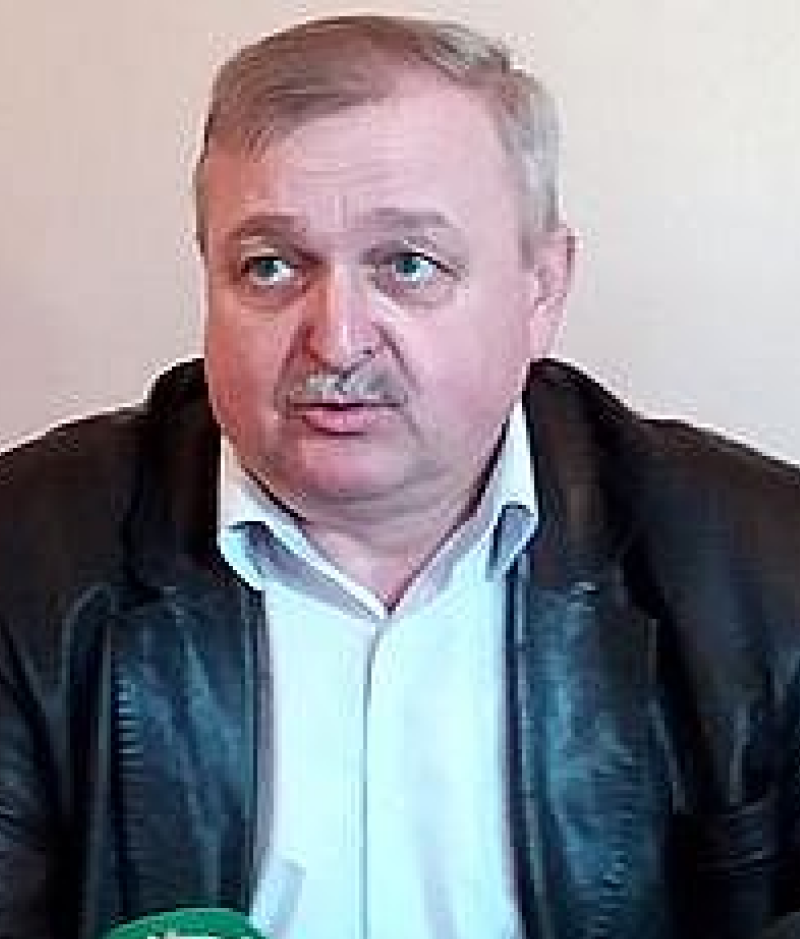
"The Chernihiv Theatre is a professional theatre. We are famous in Ukraine. Actors come here to work with Andrii Bakirov. Our directors are Denys Fiedieshov and Nastia Kuzyk, who are famous in Ukraine. Denys is currently in the army, and Nastia has recently become a mother, but she is talented. We are actively recruiting local and other directors who want to join us. When the war is over, there will be a breakthrough; we will rise and do even more. That is the way it should be; that is what we are working for."
How the Crimean Tatar restaurant Sofra recovered from the rocket attack
The blast from the rocket spread across Krasna Square and the surrounding buildings. The Crimean Tatar restaurant Sofra was also damaged across the street from the theatre. The restaurant's manager, Anna Zahreba, says the building was severely damaged.
"Our windows and doors were completely blown out. The wall facing the theatre flew in. Everything inside was also blown out. Only the third hall remained intact. The equipment closer to the exit — the box office and computers — was completely smashed. Even pieces of plaster fell from the ceiling, quite large pieces," she says of the damage to the restaurant.
Anna says the restaurant's guests and employees were not injured. But it was sheer luck because no one had time to go to a shelter. The strike started quickly after the alarm sounded—within a few minutes.
After the strike, the restaurant staff removed the broken windows and plaster to get the business back up and running as quickly as possible. Three days later, in August, the summer terrace was opened to customers. Initially, however, there were few visitors.
"In the first month, we earned 1/10 of our average income. It was tough. People didn't want to sit outside. There was still blood on the pavement, and the theatre had a ruined roof," Anna recalls.
The restaurant reopened not only to raise money to restore the building and pay the staff but also because of the team's inner desire to get back to work as soon as possible despite the blow, to show that life goes on, that destruction, tragedy, and war cannot stop it.
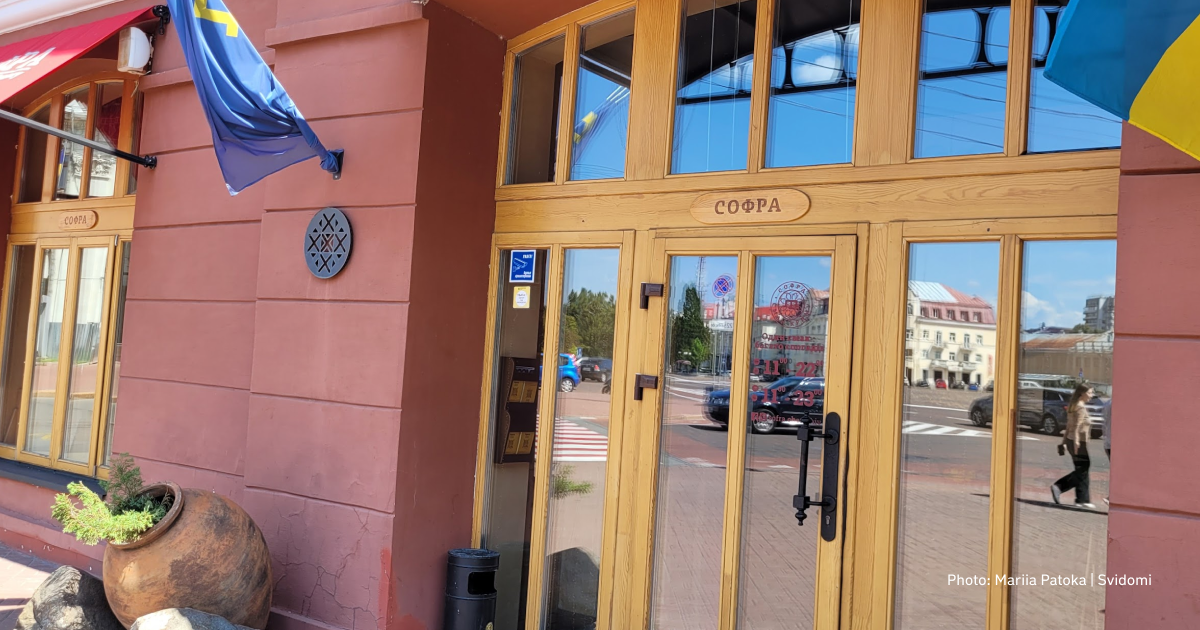
It took a month to renovate the premises, and Sofra was back in full operation in September. Now that Sofra has enough guests, it is a popular place. The banqueting hall is packed in the evenings, and the flow of people does not slow down during the day. Life goes on in Chernihiv despite the war.
The story of the Crimean Tatar restaurant in northern Ukraine is also a story of different regions of Ukraine getting to know each other. Asan Budzhurov, the owner of Sofra, set out to showcase the culture and taste of Crimea (Qırım) through traditional dishes and presentation, says Anna, the manager.
"Asan is our brand chef. He is a Crimean Tatar who left Crimea in 2012. We try to convey a piece of Crimea in our restaurant. We want to remind our guests of the flavours they tasted on the south coast of Crimea. We are very happy when people from Crimea come to us and say: 'We haven't tasted this for so long, it's so delicious." That is the best thing — to give these people back a piece of home. We want Crimea to be with us again."
An act of terrorism or a war crime — how the investigation into the rocket attack on the Drama Theatre is ongoing
Immediately after the rocket attack, the Security Service of Ukraine opened a case under the article on violation of the laws and customs of warfare. The Security Service of Ukraine is also investigating official negligence, as the Chernihiv Regional Military Academy allowed the drone exhibition to take place in the theatre.
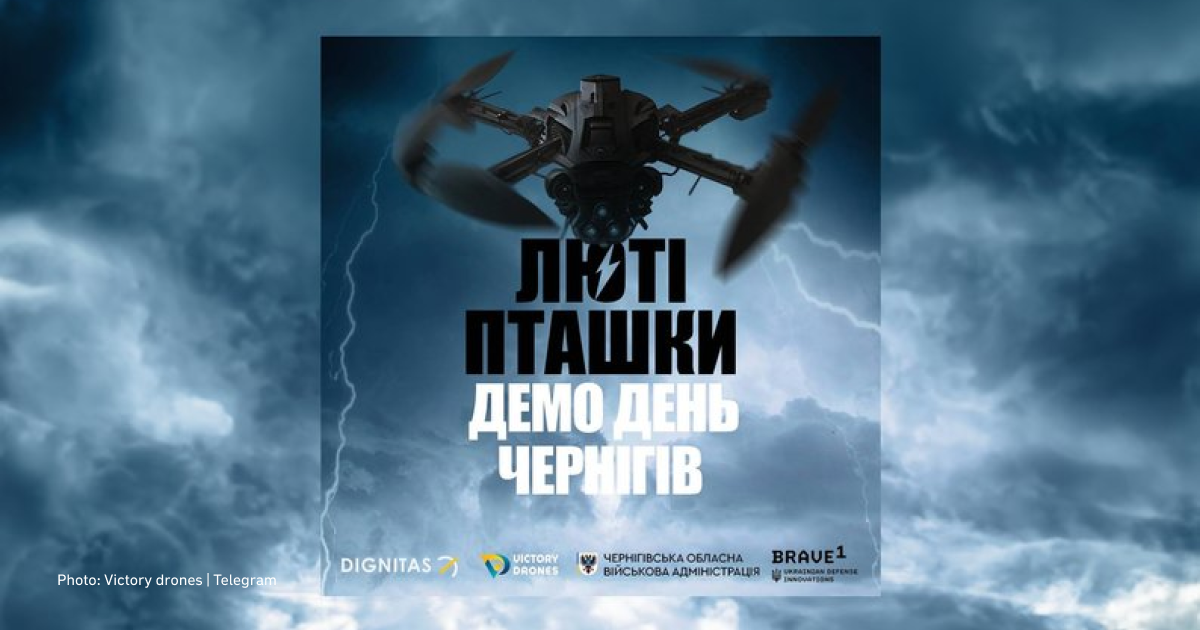
Chernihiv is not as affected by Russian shelling as Nikopol, Kharkiv or neighbouring Sumy, which are closer to the front line (the Sumy and Kharkiv regions border Russia in the north and east of Ukraine — ed). The Russian army regularly shells the border areas of the region. However, the attacks on civilian infrastructure indicate an attempt to inflict as much damage as possible on the city's inhabitants and to create panic. This raises the question of whether massive Russian shelling of Ukrainian towns and villages, such as the rocket attack on the Chernihiv Drama Theatre, can be considered acts of terrorism.
Lawyers from Truth Hounds, a war crimes investigation organisation, have also been working with law enforcement agencies to determine the trajectory of the missile and those who launched it.
Volodymyr Hryshko, a lawyer with Truth Hounds, says the main factor in determining the nature of such a crime is the presence of an international armed conflict, that is, a war waged by Russia against Ukraine.
"We could talk about a certain terrorist act even within the framework of an armed conflict, if these actions were not directly related to the conduct of military operations. For example, if a certain organization or group, within the borders of Ukraine away from the contact line, or even not far from the front, took some hostages in a conditional shopping center and demanded from the government the recognition of some ideology or religion at the state level, then it would really be a terrorist act. But this is already happening outside the context of Russia's war with Ukraine."
Therefore, the main qualification of Russian crimes in Ukraine is violation of the laws and customs of war. Volodymyr explains that international law and practice do not usually combine terrorism and war crimes.
"The Russians can claim that their attack on the Officers' House in Vinnytsia, the strike on Chernihiv, where there was an exhibition of drones, was intended to gain some military advantage. And in general, these strikes take place in the course of Russia's armed conflict against Ukraine. That is, these strikes are connected with the conduct of an armed conflict, and therefore international humanitarian law is appropriate for application in these cases."
But Russia bears full responsibility for such strikes, says Volodymyr. It is a densely populated city, a day off, the centre. The fact that military personnel might have been at the exhibition or in the city centre is not an argument to justify the Russians.
"The Russians cannot justify their attack on the grounds of an exhibition, especially given the type of detonator they used and the type of missile they used. The responsibility lies entirely with the Russians. It is quite difficult to separate civilian and military life in a country that fights with an army of millions. We cannot legitimise the attack by the Russians just because someone from the military is in the city," he says.
Investigating the rocket attack, journalists from Suspilne Chernihiv found that four Russian brigades — 112, 152, 26 and 448 — could be responsible for the rocket launch. Representatives of the brigades that the journalists managed to talk to vehemently denied involvement in the theatre attack.
The director of the Chernihiv theatre, Serhii Moisiienko, says he believes a fair punishment for the Russian military who attacked the theatre would be formal arrest and trial.
"It will sound strange coming from the head of an artistic institution, but I support the idea of creating a Ukrainian Mossad (Israel's foreign intelligence service, known for tracking down and arresting criminals against Israel — ed) because the Russians simply need to be eliminated. They are not men, they are animals. He thinks he is a human being. He goes to his family, to his children and women, after the atrocities he committed in Ukraine. He gets on a plane, flies out on a combat mission and then tells the children where the missile went and where it hit. I'm sorry. I would be happy if these people were convicted and isolated from any society. They have no place on earth."
The tragedy in Chernihiv was a year ago. Russia's war against Ukraine is not over, and Russia continues to launch massive attacks on Ukrainian infrastructure. On July 8, 2024, the Russians launched a missile attack on the Okhmatdyt hospital in Kyiv. On August 9, 2024, they shelled a shopping mall in Kostiantynivka. On the afternoon of May 25 2024, the Russian army targeted the Epicentre shopping mall in Kharkiv, killing 19 people.
The Russians launched a rocket attack on a hotel in Chernihiv, killing 17 people on April 17, 2024.
The number of such attacks is increasing, so those that happened earlier may disappear from media coverage. Volodymyr Hryshko, a lawyer with Truth Hounds, says this is a natural process as the war continues. But Ukrainian law enforcement agencies are recording tens of thousands of Russian war crimes, most of which do not make it into the media.
"You have to understand that you will never go to court with all the hundreds of thousands of cases because even a thousand cases will take 10 years. We have to think about prioritising these cases, taking the most horrific ones and pursuing the criminals, trying to find them and taking them to court. In this case, the media attention and focus will be on the most horrific things. At the same time, we shouldn't forget to record, document, and sometimes talk about other cases. Because any war crimes committed by the Russians cannot be orchestrated, they are horrific in their own right".
Svidomi sent a request to the Office of the Security Service of Ukraine in the Chernihiv region, asking for an explanation of the status of the investigation into the rocket attack on the theatre. In response to our request, the SSU in the Chernihiv region replied that the investigation was being conducted under three articles of the Criminal Code of Ukraine – Art. 438 (violation of the laws and customs of war), Art. 114-2 (unauthorised dissemination, committed under martial law, of intelligence on the sending and movement of weapons, armaments and ammunition to Ukraine, or the movement or location of the Armed Forces of Ukraine), and Art. 367 (official negligence). The investigation is at the pre-trial stage.

